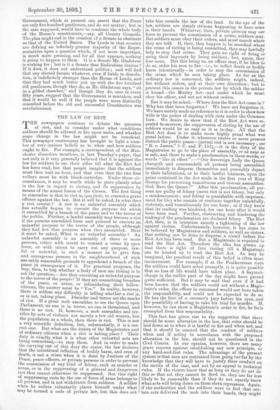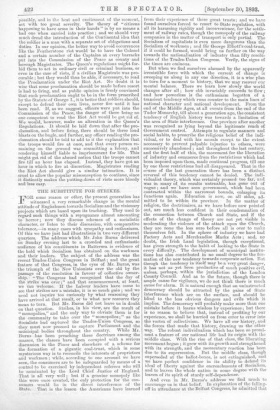THE LAW OF RIOT. T HE newspapers continue to debate the
question of riot, and to consider under what conditions soldiers should be allowed to fire upon mobs, and whether some change in the law might not be beneficial. This newspaper controversy has brought to light a, num- ber of very curious beliefs as to when and how soldiers ought to fire. For example, a correspondent of the Man- chester Guardian mentions, in last Tuesday's paper, that not only is it very generally believed that it is against the law for soldiers to use their rifles till after the Riot Act has been read, but that people imagine that the soldiers must then wait an hour, and that even then the two first volleys must be with blank-cartridge. Under these cir- cumstances, it may be worth while to tate plainly what is the law in regard to rioting, and is suppression by means of the armed forces of the Crown. The first thing to remember is that to riot is, ipso facto, to commit a, grave offence against the law. But it will be asked, In what does a riot consist ? A riot is an unlawful assembly which has actually begun to execute the purpose for which it assembled by a breach of the peace and to the terror of the public. Further, a lawful assembly may become a riot if the persons assembled form and proceed to execute an unlawful purpose to the terror of the people, although they had not that purpose when they assembled. Next it must be asked, What is an unlawful assembly ? An unlawful assembly is an assembly of three or more persons, either with intent to commit a crime by open force, or with intent to carry out any purpose, law- ful or unlawful, in such a manner as to give firm and courageous persons in the neighbourhood of such ass mbly reasonable grounds to apprehend a breach of the peace m consequence of it, For practical purposes, the way, then, to test whether a body of men are rioting is to ask the question,—Are they executing an unlawful purpose to the terror of the people? If they are committing breaches the peace, or arson, or intimidating their fellow- citizens, the answer must be "Yes." In reality, however, there is seldom any difficulty in telling whether a riot is, or is not, taking place. Disorder and terror are the marks of riot. If a great mob assembles to see the Queen open Parliament, no one is in terror, no one is threatened, and there is no riot. If, however, a mob assembles and ter- rifies by acts of violence not merely a few old women, but the population as a whole, then there is riot. This is not a very scientific definition, but, substantially, it is a cor- rect one. But what are the duties of the Magistrates and of ordinary citizens when a riot is taking place ? Their duty is exactly what it is when other unlawful acts are being committed,—to stop them. And in order to make the carrying out of this duty the easier, the law declares that the intentional infliction of bodily harm, and even of death, is not a crime when it is done by Justices of the Peace, peace officers, or private persons in order to prevent the commission of any kind of felony, such as murder or arson, or in the suppressing of a general and dangerous riot that cannot otherwise be suppressed. But this right of suppressing riots by the use of force of arms belongs to all persons, and is not withdrawn from soldiers. A soldier when he enlists voluntarily places himself under what may be termed a code of private law, but this does not take him outside the law of the land. In the eye of the law, soldiers are simply citizens happening to have arms in their hands. Whenever, then, private persons may use force to prevent the commission of a crime, soldiers may. But soldiers must obey their orders, and must march where they are told. If, then, they happen to be marched where the crime of rioting is being committed, they may lawfully help to stop that crime. They gain no right of firing or using their bayonets by being soldiers ; but, again, they lose none. But this being so, an officer may, if he likes to- do so, order his men to fire—i.e., to inflict death or bodily harm intentionally—in order to stop the commission of the crime which he sees taking place. As far as the ordinary law is concerned, the soldiers might, indeed, fire without orders, and at their own discretion ; but to prevent this conies in the private law by which the soldier is bound—the Mutiny Act—and under which he must obey his officer, and not act without orders.
But it may be asked,—Where does the Riot Act come in ? Why has that been forgotten ? We have not forgotten it. We have merely made no reference to it in order to show how wide is the power of dealing with riots under the Common. Law. We desire to show that if the Riot Act were re- pealed to-morrow, the suppression of rioting by the use of soldiers would be as easy as it is to-day. All that the Riot Act does is to make more highly penal what was-- penal before. Under it, whenever twelve or more persons disturb the public peace—(actual riot is not necessary ; see "B. v. James," 5 C. and P. 153),—it is the duty of the Magistrates to go to the place of assembly, or as near as is safe, and there to make a proclamation in these words, or words "like in effect":—" Our Sovereign Lady the Queen chargeth and commandeth all persons being assembled immediately to disperse themselves and peaceably depart to their habitations, or to their lawful business, upon the pains contained in the Act made in the first year of King George for preventing tumultuous and riotous assemblies. God Save the Queen !" After this proclamation, all per- ROW are guilty of felony (mere riot is not felony, but only a. misdemeanour; and felony is punishable with imprison- ment for life) who remain or continue together unlawfully, riotously, and tumultuously for one hour; or if they know that its reading was hindered, for one hour after it would have been read. Further, obstructing and hindering the making of the proclamation are declared felony. The Riot Act, then, is in intention merely a tightening of the law against rioters. Unfortunately, however, it has come to be believed by Magistrates and soldiers, as well as rioters,. that nothing can be done to disperse a crowd before the Riot Act has been read. But a Magistrate is required to read the Riot Act. Therefore the idea has grown up that there is right of free rioting till a Magistrate can be hunted up to read the Riot Act. As may be imagined, the practical result of this belief is often most inconvenient. For example, if at the Featherstone riots the soldiers could have acted promptly, it is quite possible that no loss of life would have taken place. A bayonet- charge in the earlier part of the day might have proved quite sufficient. But it may be said that even if it had been known that the soldiers could act without a Magie.- trate's order, the officer in command would not have taken the responsibility, and could not be expected to do so. He has the fear of a coroner's jury before his eyes, and the possibility of having to take his trial for murder. If, however, he can show a Magistrate's order to fire, he feels exempted from this responsibility.
This fact has given rise to the suggestion that there should be some alteration in the law, that rules should be laid down as to when it is lawful to fire and when not, and that it should be enacted that the conduct of soldiers- when and if acting in accordance with the proposed alteration in the law, should not be questioned in the Civil Courts. In our opinion, however, there are many grave reasons against establishing any new principle, or any hard-and-fast rules. The advantage of the present system is that men are restrained from going too far by the knowledge that they will have to justify their conduct on the merits of the case, and not by an appeal to technical rules. If the rioters know that as long as they do not do this or that act they cannot be fired on, they are far lest likely to be reasonable than if they do not exactly know what acts will bring down on them stern repression. Again, if the authorities and the soldiers were to feel that cer- tain acts delivered the mob into their hands, they might possibly, and, in the heat and excitement of the moment, act with too great severity. The theory of "citizens happening to have arms in their hands" is by no means a bad one when carried into practice ; and we should very much dread the introduction of the Continental idea that the soldier is a man with a separate set of obligations and. duties. In our opinion, the better way to avoid occurrences like the Featherstone riot would be to have the Colonel and a certain number of the Captains at every barracks put: into the Commission of the Peace as county and borough Magistrates. The Queen's regulations might for- bid them to act in ordinary civil or criminal business, or even in the case of riots, if a civilian Magistrate was pro- curable ; but they would thus be able, if necessary, to read the Proclamation under the Riot Act. No doubt it is wise that some proclamation should be made before resort is had to firing, and as public opinion is firmly convinced that such proclamation ought to be in the form prescribed by the Statute of George I., it is better that soldiers should, except to defend their own lives, never fire until it has been read. If, as we suggest, officers were put into the Commission of the Peace, the danger of there being no one competent to read the Riot Act would be got rid of. We would, however, make an alteration in the Queen's Regulations. It should be laid down that after the pro- clamation, and before firing, there should be three loud blasts on the bugle, and further, any officer reading the pro- clamation should be told to add to it the explanation that the troops would fire at once, and that every person re- maining on the ground was committing a felony, and rendering himself liable to imprisonment for life. This might get rid of the absurd notion that the troops cannot fire till an hour has elapsed. Instead, they have got an hour in which to fire at discretion. Magistrates reading the Riot Act should give a similar intimation. It is cruel to allow the popular misconception to continue, since it distinctly makes the putting-down of riots more bloody and less easy.



































 Previous page
Previous page